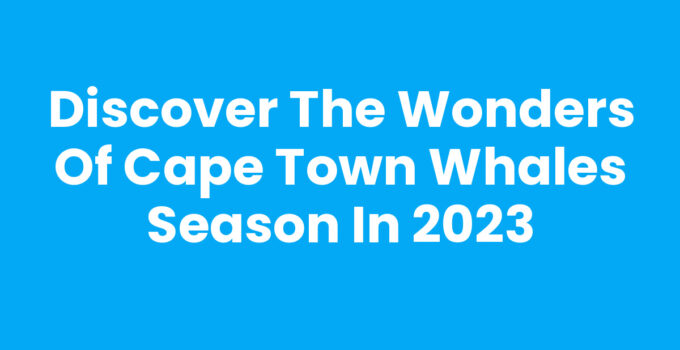As winter approaches and the chill in the air becomes tangible, Cape Town transforms into a marvelous destination for nature enthusiasts and wildlife lovers. Among its many spectacles, the Cape Town Whales Season stands out, offering a captivating experience that attracts visitors from around the globe. This biannual event is marked by the arrival of southern right whales along the coast, providing breathtaking sights and unforgettable experiences.
Cape Town Whales Season: A Comprehensive Guide
Cape Town boasts a unique geographical location that forms part of the migratory path for humpback and southern right whales. They journey thousands of miles from their feeding grounds in Antarctic waters to the warmer, shallow waters of the South African coast. The Cape Town Whales Season runs from June to November, with the peak viewing times often falling from July to October. During this period, you can witness these majestic creatures breaching, tail-slapping, and nursing their young right off the coast.
Best Locations for Whale Watching
To ensure you capture the best views, here are some prime locations known for whale watching:
- Hermanus: Often dubbed the whale-watching capital of the world, Hermanus offers cliffs that provide spectacular viewpoints.
- False Bay: A range of boat tours operates from Simon’s Town and Kalk Bay, giving you close encounters with these gentle giants.
- Cape Point: The dramatic scenery combined with the chance to spot whales makes this a must-visit destination during the season.
Best Times for Whale Watching
While whales can be spotted sporadically throughout the season, here are some tips on the best times:
- Morning Light: Early morning is often ideal for spotting whales, as they tend to be more active.
- Weather Conditions: Check forecasts to time your outing for calm seas; rocky waters can reduce whale visibility.
- Whale Festivals: Attend local festivals during peak season. They typically include additional activities and enhance the experience.
Guided Tours vs. Self-Exploration
You have two primary options when it comes to enjoying the whales:
- Guided Tours: Many companies offer whale watching trips led by knowledgeable guides who can provide insights on whale behavior and ecology. These are often well-organized and ensure the best chances of finding whales.
- Self-Drive Exploration: If you prefer independence, renting a car to explore scenic coastal routes and designated viewing points can be rewarding.
Other Considerations for Whale Watching
While enjoying the Cape Town Whales Season, it is essential to be respectful of the wildlife:
- Follow Guidelines: Always adhere to local regulations regarding distance and behavior around whales.
- Minimize Noise: When on a boat, minimize loud sounds to avoid disturbing the whales during their time in shallow waters.
- Protect the Environment: Make sure to take all trash with you and encourage responsible tourism practices.
Conclusion
The Cape Town Whales Season offers a remarkable opportunity to connect with nature and witness one of the ocean’s most enigmatic species. By planning your trip around the best viewing times, choosing the right locations, and respecting the whales and their environment, you can ensure an enriching experience. Grab your binoculars, keep your camera ready, and prepare to be amazed!
Frequently Asked Questions
When is the best time to see whales in Cape Town?
The best time for whale watching in Cape Town is from June to November, with peak sightings occurring between July and October.
Where are the best places to watch whales in Cape Town?
Hermanus, False Bay, and Cape Point are among the best locations for whale watching in Cape Town.
Are there guided tours available for whale watching?
Yes, many companies offer guided whale watching tours that provide insights and increase your chances of spotting whales.



